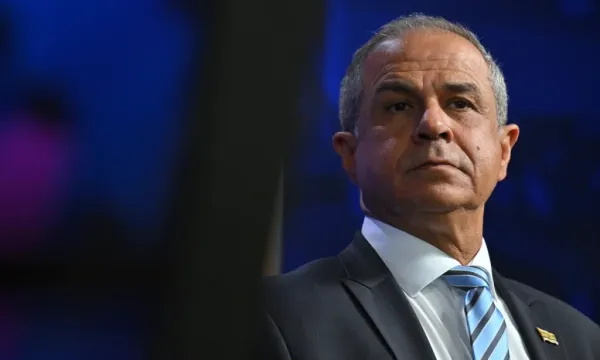

Australia has taken a decisive diplomatic step by expelling Iran’s ambassador and three other officials, accusing Tehran of orchestrating antisemitic attacks on Australian soil. The move, announced by Prime Minister Anthony Albanese, comes amid growing concerns over social unrest and targeted violence against the Jewish community in Melbourne and Sydney. The expulsion is part of a broader response by Australia to what officials describe as dangerous acts of aggression orchestrated by a foreign nation, which have threatened social cohesion and community safety. This decision also underscores the deepening tension between Australia and Iran, as well as the broader international concern regarding the impact of geopolitical conflicts on diaspora communities. The Iranian officials have been given seven days to leave Australia, while the country has also suspended operations at its embassy in Tehran and plans to designate Tehran’s Islamic Revolutionary Guard Corps as a terrorist group, signaling a significant escalation in diplomatic measures.
Pattern of Antisemitic Attacks and Community Impact
Australia has witnessed a troubling pattern of antisemitic attacks in recent years, which have intensified following the outbreak of the Israel-Gaza conflict in 2023. Authorities report multiple instances of targeted aggression, ranging from vandalism and graffiti to arson and coordinated mob attacks, leaving communities on edge. Melbourne and Sydney, home to substantial Jewish populations, have been at the center of these incidents, highlighting the vulnerabilities faced by minority communities in a period of global political tensions.
The series of attacks have included graffiti targeting Jewish institutions, as well as acts of physical aggression against synagogues and businesses. In October 2024, a Jewish bakery in Sydney was defaced with antisemitic graffiti, sending shockwaves through the local community. A month later, residents in a predominantly Jewish area of the city experienced arson attacks targeting vehicles and vandalism that destroyed property. These incidents were widely condemned by local authorities and community leaders, who warned that foreign interference could exacerbate tensions and encourage extremist behavior.
In Melbourne, the attacks have been particularly alarming. During a Shabbat dinner in July, protestors poured flammable liquid on the doors of a synagogue and attempted to set it on fire. Approximately 20 people were inside the building at the time, but fortunately, no injuries were reported. The same period also saw an Israeli restaurant targeted by protestors, with acts of vandalism and intimidation designed to instill fear within the community. These high-profile attacks have highlighted the severity of the threat and prompted Australian authorities to take urgent and unprecedented measures against foreign actors believed to be involved.
According to law enforcement agencies, approximately 40 individuals have been arrested over antisemitic offenses, while eight people faced charges in connection with arson incidents. Authorities describe the acts as not merely isolated incidents of hate crime but as part of a coordinated campaign influenced or orchestrated by foreign entities. Investigations into these attacks have revealed links suggesting that external actors sought to exploit existing social fault lines, inflame tensions, and destabilize communities. This has raised broader concerns about national security and the vulnerability of minority communities in a globalized context, where conflicts abroad can manifest in local violence and intimidation.
The psychological and social impact of these attacks has been profound. Members of the Jewish community have reported heightened fear, anxiety, and disruption to daily life. Educational institutions, religious organizations, and businesses have all been forced to enhance security measures, with heightened police presence and community patrols becoming commonplace. Community leaders have emphasized the importance of resilience and unity while calling for strong government action to deter future aggression.
Diplomatic and Security Measures Against Iran
The Australian government has responded to these threats with a series of significant diplomatic and security measures. Prime Minister Anthony Albanese described the attacks as “extraordinary and dangerous acts of aggression orchestrated by a foreign nation on Australian soil” and emphasized that such actions were aimed at undermining social cohesion and spreading discord within Australian society. In addition to expelling Iran’s ambassador and three other officials, the government has suspended operations at the Australian embassy in Tehran and is moving to designate Tehran’s Islamic Revolutionary Guard Corps as a terrorist organization.
This designation carries far-reaching implications, signaling Australia’s readiness to take strong action against entities deemed to pose a threat to national security and public safety. The government’s approach combines diplomatic measures with law enforcement efforts, reflecting a multi-pronged strategy to protect communities and deter foreign interference. The expulsion of Iranian officials is particularly significant, as it sends a clear message regarding Australia’s intolerance of foreign-led intimidation and aggression.
Internationally, the step taken by Australia highlights the complex intersection of global conflicts and domestic security. The escalation of antisemitic attacks in Australian cities mirrors broader patterns observed in other countries where diaspora communities are directly affected by distant geopolitical conflicts. Analysts note that these incidents underscore the need for comprehensive strategies that integrate intelligence, community engagement, and diplomatic action to safeguard vulnerable populations.
The decision to target Iran specifically follows thorough intelligence assessments linking elements of the Iranian state, including agents and proxies, to the planning and encouragement of antisemitic acts. By holding Iran accountable for actions conducted on Australian soil, authorities aim to disrupt the mechanisms through which foreign powers seek to influence and destabilize local communities. This approach also serves as a warning to other nations regarding the consequences of engaging in covert operations that threaten social harmony in foreign states.
Security measures have been complemented by a proactive law enforcement approach. Police departments in Melbourne and Sydney have intensified patrols near Jewish institutions, increased surveillance, and coordinated with community leaders to ensure rapid response to potential threats. Special task forces have been deployed to investigate arson, vandalism, and other antisemitic offenses, and authorities continue to work closely with federal agencies to monitor foreign involvement.
Community responses have emphasized solidarity and resilience. Religious leaders, civil society groups, and local authorities have organized awareness campaigns, community outreach programs, and interfaith initiatives aimed at fostering understanding and reinforcing social cohesion. These efforts have been crucial in mitigating the impact of attacks, ensuring community members feel supported, and sending a collective message against hate and intolerance.
Australia’s actions against Iran, therefore, represent a comprehensive response encompassing diplomatic, security, and community-oriented strategies. The expulsion of diplomats, suspension of embassy operations, and potential terrorist designation of the IRGC underscore a commitment to safeguarding citizens while addressing the broader geopolitical dimensions of antisemitic aggression. The Australian government’s proactive stance serves as a model for other nations facing similar threats from foreign actors, highlighting the importance of swift and coordinated action in defending both national security and minority rights.
The unfolding events in Melbourne and Sydney, coupled with Australia’s firm diplomatic measures, underscore the interconnectedness of global conflicts and local security dynamics. As communities grapple with the immediate impacts of foreign-influenced attacks, government authorities continue to pursue policies aimed at preventing recurrence, ensuring that Australia remains a safe and cohesive society. The situation also highlights the role of international cooperation, intelligence sharing, and vigilant civil governance in countering the transnational threats posed by politically motivated violence and hate crimes.
The expulsion of Iranian diplomats has been accompanied by broader discussions within Australia regarding legislative and policy tools to address antisemitism and protect vulnerable communities. Measures under consideration include enhancing laws against hate speech, increasing penalties for incitement and acts of violence, and strengthening mechanisms to identify and respond to foreign interference. These initiatives reflect a comprehensive understanding of the threat environment and a commitment to long-term social resilience.
The Australian government’s decisive response to the recent spate of antisemitic attacks demonstrates both the immediate necessity and long-term strategy required to protect communities in an era of globalized threats. The expulsion of the Iranian ambassador, suspension of embassy operations, and potential terrorist designation of the IRGC collectively send a strong message regarding accountability, national security, and the protection of minority populations. Australia’s approach reflects the challenges and complexities of balancing diplomatic engagement, domestic security, and social cohesion in the face of foreign-led aggression and serves as a critical precedent for addressing similar threats globally.
The post Australia expels Iranian ambassador, citing orchestrated antisemitic attacks amid rising tensions over Israel-Gaza conflict | cliQ Latest appeared first on CliQ INDIA.
-
SC Irked Over All'bad HC Adjourning Bail Plea 43 Times, Grants Relief

-
Capricorn Horoscope Today, 28th August 2025: Focused efforts bring steady progress

-
Common passport mistakes that could deny you entry

-
Play, eat clean and screen-off: Tennis Maestro Billie Jean King shares her secrets for a healthy life at 81

-
Florida’s “Alligator Alcatraz” detention facility may be emptied soon-here's what a top official says about the closure
